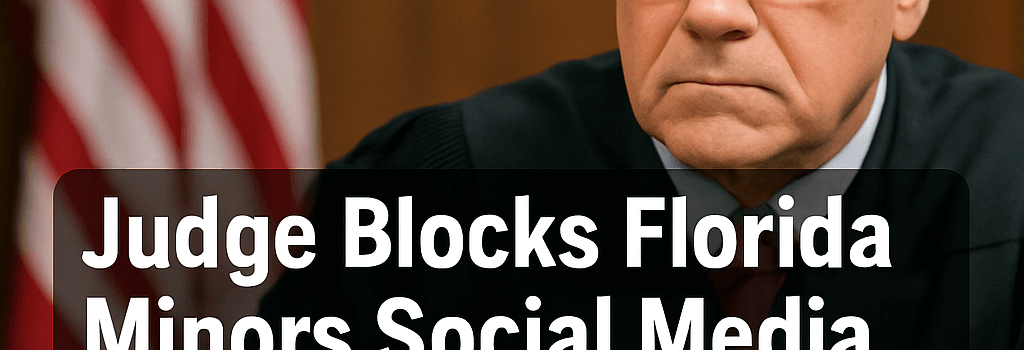Judge Blocks Florida Minors Social Media Ban: Key Implications

Preliminary Injunction Halts Enforcement Over First Amendment Concerns
On June 3, 2025, US District Judge Mark Walker of the Northern District of Florida granted a preliminary injunction against Florida’s new law barring minors from social media platforms. The decision, rendered in response to a lawsuit by the Computer & Communications Industry Association (CCIA) and NetChoice, contends that the statute is “likely unconstitutional” under the First Amendment.
Case Background and Judicial Ruling
Florida’s HB 1B-149 prohibits Floridians under 14 from creating accounts on any platform employing one of five specified “addictive features” (infinite scroll, autoplay video, algorithmic recommendations, push notifications, and streak counters). Users aged 14–15 may only participate with parental consent. The state argued these measures intend to reduce youth exposure to dopamine-driven engagement loops. Judge Walker, however, described the restrictions as “an extraordinarily blunt instrument” that sweeps up core forums for protected speech, including Facebook, Instagram, YouTube, and Snapchat.
“Even assuming the significance of the State’s interest in limiting exposure of youth to ‘addictive features,’ the law’s restrictions are a blunt instrument that likely bans all youth under 14 from key platforms,” Walker wrote.
Legal Framework: Intermediate Scrutiny
The court applied intermediate scrutiny, requiring laws that incidentally burden speech to be narrowly tailored to a significant government interest, leave open ample alternative channels, and burden no more speech than necessary. Judge Walker found HB 1B-149 fails each prong by imposing a blanket ban regardless of less restrictive technical countermeasures.
Technical Implementation Challenges
Mandating age‐gating at internet scale presents multiple engineering obstacles:
- Age Verification Technologies: Platforms must integrate SDKs for ID document scanning, biometric facial analysis, and third‐party Know Your Customer (KYC) providers. Accuracy rates vary (typically 85–95%), and false negatives can disenfranchise legitimate users.
- API and SDK Modifications: Social networks need to overhaul OAuth flows to include explicit age claims, feature‐flag engines to disable infinite scroll or notifications for minors, and create real‐time auditing logs to demonstrate compliance on a per‐request basis.
- Machine Learning Classifiers: Behavioral models that infer age from usage patterns (session length, posting frequency) carry demographic bias risks. Misclassification can lead to wrongful suspensions or legal exposure.
Privacy and Encryption Considerations
Collecting additional personal data to verify age conflicts with data-minimization principles under COPPA and GDPR’s Article 25. Experts warn that storing scanned IDs or biometric templates increases attack surfaces and complicates end‐to‐end encryption, since platforms may require selective message decryption to enforce feature restrictions for minors.
Legislative Context and International Comparisons
Globally, regulators are grappling with youth safety online. The EU’s Digital Services Act mandates “age-appropriate design” and transparency in algorithmic feeds. The UK’s Online Safety Bill requires risk assessments for children’s exposure. In the US, the Supreme Court is reviewing the Texas law in Free Speech Coalition v. Paxton, which mandates age verification on adult websites—its outcome will influence standards for evaluating restrictions on protected speech.
Expert Commentary and Industry Reactions
Matt Schruers, CCIA CEO: “This ruling vindicates our argument that Florida’s statute violates the First Amendment by blocking minors from lawfully speaking online.”
Meta and Google have accelerated deployment of AI‐driven safety pipelines using transformer‐based moderation models to detect harmful content without wholesale account suspensions. Apple’s upcoming iOS 17 will introduce opt-in zero-knowledge verifiable credentials to confirm user age while preserving privacy.
Broader Implications and Next Steps
The injunction leaves intact parental-request account terminations but enjoins the outright creation ban. Platforms must now architect robust compliance frameworks, balancing feature‐flag systems, cryptographic age-proof mechanisms, and privacy safeguards. They are also monitoring the Supreme Court’s imminent decision in Free Speech Coalition v. Paxton, which could redefine how courts assess adult‐speech burdens arising from age-restriction laws.
Conclusion
Judge Walker’s order highlights the tension between protecting youth and upholding constitutional free speech in the digital age. As the litigation proceeds, the outcome will set a critical precedent for age‐gating requirements and platform liability, shaping the future of online expression and child safety.